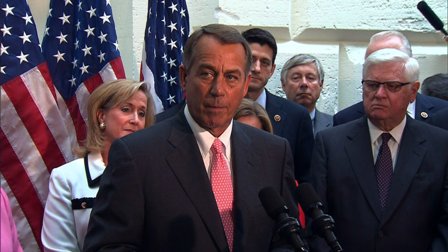 It just about broke Elise Kamin's heart to have to tell her 6-year-old daughter, Piper, that she couldn't buy her a Halloween costume this year.
It just about broke Elise Kamin's heart to have to tell her 6-year-old daughter, Piper, that she couldn't buy her a Halloween costume this year.
The child knows little about the adult struggles that Kamin and her fiance are facing as federal employees who have been working without pay since October 1. Kamin, who works for the Social Security Administration in Winter Haven, Florida, is trying to shield Piper and her 9-year-old brother as long as she can.
"Having to explain to your children why they can't go to tutoring right now, or why they can't get a Halloween costume or pumpkin, or why they can't attend a friend's birthday party, all because of this nonsense in Washington, is horrible," Kamin wrote on CNN iReport.
She said she shared her story with CNN because "I feel like I have no other way to voice my concerns and to help my children than to speak up."
Since the U.S. government went on a partial shutdown, CNN iReport has received more than 1,500 stories from families, many sharing fears and worries about what will happen if the impasse lags on.
Plenty of families are already feeling the collateral damage -- and begging for an end to the paralysis in Washington.
'Put my grandma back to work'
On Tuesday, 59-year-old Joy Lorien had to ask her two grandchildren to eat the free breakfast offered at school because her cupboards were bare. She always makes the 9- and 10-year-olds breakfast -- fried potatoes, a little bacon, cut-up bananas and a sweet roll. She cried just thinking about it as she took them to school. Lorien also reflected on the irony of the situation -- her grandchildren having to take government assistance because the government forced her out of work.
It would normally be peak season at the Skyland Resort in Shenandoah National Park in Virginia, where Lorien has worked as a server or hostess for the past 30 years. She can usually count on making $1,000 a week this month -- enough to get her through the four months of the year when the lodge is closed.
But temporary layoffs for Lorien and 200-plus workers at the resort went into effect on October 1 after the park's closure. She expects to come back to work after the government resumes, but she won't get back any of her lost pay because the lodge is owned by a private company.
Losing her job in October "has taken my Christmas savings away, has taken what I could have saved for winter to get heat, food and pay my bills," she wrote. "How can anyone who had a part in shutting down the government look at themselves in the mirror?"
Writing letters to the editor of her newspaper and going to protests with her grandson has helped Lorien feel like she's making her voice heard. The boy held a sign he made that said "Please put my grandma back to work."
Furloughed 90 percent of his staff
Small-business owner Buddy Gilmore estimates he's losing $40,000 in revenue a week. His company does modeling and simulation, as well as network engineering, for the Department of Defense. And that number doesn't include the $300,000 in outstanding invoices he has from a project work completed in July. "That's pretty tough for a small business," he said.
He's had to furlough 90 percent of his Colorado Springs, Colorado, staff because of lost business. And because his employees are not federal workers, they won't recoup that pay, he said.
"My mind is with my employees, some of whom have run out of vacation time and are dipping into their savings," Gilmore said. "I have offered up early Christmas bonuses, and some have opted to take them."
But his attempts to make the best of the situation aren't enough to assuage all of his employees.
"Some of my best and brightest employees are already looking for employment elsewhere, and they would be very hard to replace," he said. "Our shutdown fears have been realized."
'I am collateral damage'
Elise Kamin is a claims representative for the Social Security Administration in Winter Haven, Florida, and her fiance is a supervisor at the Transportation Security Administration at the Orlando airport. Both have been deemed essential workers by the government, so they must work without pay or face disciplinary action.
They'll get paid eventually, but that's little solace now when Kamin's figuring out how to stretch out her last check -- for 48 hours of pay instead of 80 -- to cover her kids' before-and-after-school care and the gas she needs to keep showing up to work.
Kamin has tried to shield her children from her money woes; they've already been through a lot, having lost their father, uncle and grandfather in a boating accident last year. But the missing paycheck is already affecting them. Kamin canceled the private tutoring her son has received since falling behind in school last year and has told her daughter she can't go to two birthday parties because they can't pay for gifts or gas to get there.
"I also have bills to pay such as food, water, electricity, housing, etc. I can only hold off creditors for so long. I can only balance the tightrope for so long," she wrote in a comment on her iReport. "I did nothing to cause this. I've done nothing but be a loyal worker. I am collateral damage."
How has the shutdown affected your life? Send a photo to iReport and tell us how the shutdown has affected you in a tangible way.
CNN's Christina Zdanowicz contributed to this story.
- Home
- News
- Opinion
- Entertainment
- Classified
- About Us
 MLK Breakfast
MLK Breakfast- Community
- Foundation
- Obituaries
- Donate
04-19-2024 9:27 am • PDX and SEA Weather










